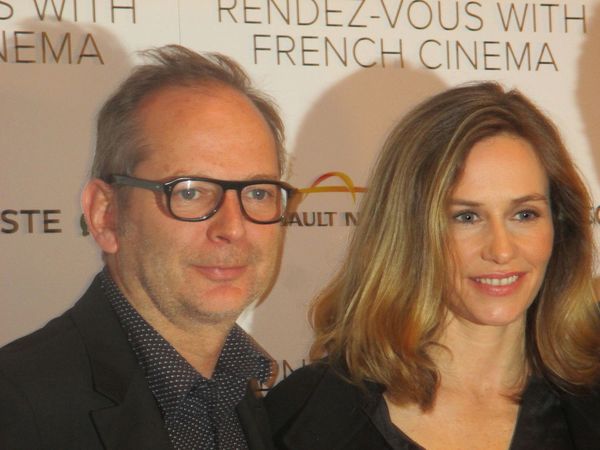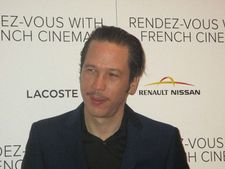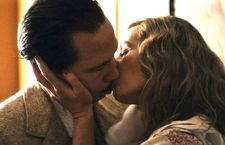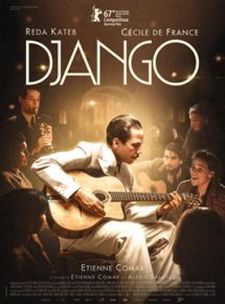 |
| Cécile de France stars in Étienne Comar's Django Photo: Anne-Katrin Titze |
On the opening night of the Rendez-Vous with French Cinema in New York, Cécile de France who stars with Reda Kateb (as Django Reinhardt) in Étienne Comar's Django, spoke with me about costume designer Pascaline Chavanne, Man Ray's muse Lee Miller as the inspiration for her character, Lauren Bacall, Edward Hopper and Claude Miller's Un Secret.
 |
| Reda Kateb plays Django Reinhardt Photo: Anne-Katrin Titze |
Django, based on the novel by Alexis Salatko, chronicles a crucial time period in world-famous jazz guitarist Django Reinhardt's life and simultaneously sheds light on the hypocrisy and contradictions at the core of Nazi policies. Admired for his musical genius, Reinhard, because of his Romani background, also was a target of the regime. In 1943, Django was a star in Paris and received an invitation by Goebbels to come play in Berlin. Certain restrictions - no foot tapping while playing, no improvisations, etc. - applied. Convinced that this could be a trap, as Sinti and Roma were persecuted and sent to concentration camps, Django's friends urge him to go into hiding. He and his family are aided by his friend Louise (Cécile de France), a woman of great strength and charisma, to flee to the border and possibly cross over from France to safety in neutral Switzerland.
Anne-Katrin Titze: How familiar were you with Django Reinhardt's music before making the film?
Cécile de France: I knew his music before because he's a genius. So it's very known. I think it's the same in New York. Because New York loved jazz and swing and Django is one of the most talented guitarists in the world. So I was a great admirer of his. And I was excited to play with Reda Kateb. The script is very good. It's not just a biopic, a classic biopic. It's only a part of his life during the war. And it's telling also the tragic story of the gypsies' community and the persecution that they lived through. So it's good to show this unknown part of his life and of the gypsies.
_225.jpg) |
| Cécile de France on Louise in Django: "The character who inspired her was Lee Miller." |
AKT: It does connect to the present as well.
CdF: Yes, it does.
AKT: Although it does tell of not-often talked about aspect of the Forties. You did do other films about that time period, as well, didn't you?
CdF: Yes, I did Un Secret by Claude Miller.
AKT: That's the one I was thinking about.
CdF: That's the only other one I did. I love period films. It's very exciting, you know the costumes, the hairstyle.
AKT: And your role in Django is an intriguing one. You don't know really who she is. She is opaque.
CdF: Exactly. Étienne [Comar] wanted Louise to be ambiguous. Mysterious with a dark side and a vulnerability. We don't know which side she is on - so that puts some tension in the story. And also, she's very independent. She's a free woman. She wears pants. She has a lot of lovers. She does what she wants to do.
AKT: You get the feeling she has a good heart. She does what she does for a purpose.
CdF: Of course. It's strange. It's beautiful because she is the lover of Django but he has a wife and I want to save his wife too. Not only Django. So I represent all those women from the Parisian intelligentsia of Montparnasse in the Thirties who worshipped Django and bring him in from the streets. Because he's a street boy and in another world from his own. So yes, it's an exciting character.
 |
| Django Reinhardt (Reda Kateb) Louise (Cécile de France): "I was excited to play with Reda Kateb." |
AKT: I also liked your interactions with the Colonel, the Nazi Colonel [played by Alex Brendemühl - also in Nicole Garcia's From The Land Of The Moon (Mal De Pierres)] very much. We don't know what is going on there.
CdF: Oh, yes. But she suffered a lot. You know, it's awful this totalitarian government is a nightmare. So she is fighting to give the freedom to Django. She's brave. She's a hothead.
AKT: The costumes, as you mentioned, are lovely.
CdF: Yes! Pascaline Chavanne did great work.
AKT: She is a big name and does wonderful work.
CdF: It's true. She did a greet job. We wanted something pictorial. From the era of film noir of this period. So we had a lot of inspiration, for example, for the character from a woman who really existed - because my character is fictional. The character who inspired her was Lee Miller. She was Man Ray's muse.
 |
| Django poster |
AKT: Of course I know her. Wow. She was the inspiration for Louise?
CdF: Yeah. We had beautiful photos of her. She was so wonderful. There is something so iconographic for the inspiration.
AKT: And you mentioned film noir - any actresses in particular?
CdF: Lauren Bacall. And also, for example, Hopper's paintings inspired us too. We had a lot of documentation. And it's so exciting to work with Pascaline - to look at the photos, pictures, paintings of this period.
AKT: And you dressed beautifully too tonight. Who made those pants?
CdF: It's JR, a Belgian stylist. He is one of my friends.
Coming up - Director Étienne Comar on Django.
The uniFrance and Film Society of Lincoln Center's 22nd edition of Rendez-Vous with French Cinema in New York, runs through March 12. Screenings will take place at the Walter Reade Theater, Lincoln Center.





















